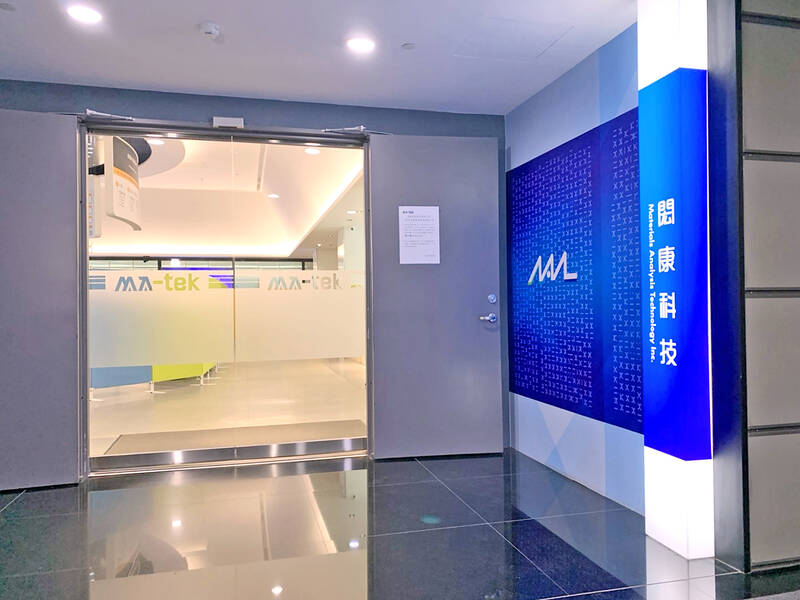Materials Analysis Technology Inc (MA-tek, 閎康), a semiconductor materials analysis service provider, yesterday said its revenue soared about 21 percent annually last year to a historic high, thanks to strong customer demand for its analysis services from Taiwan and Japan.
Revenue expanded to NT$4.81 billion (US$155.2 million) last year, compared with NT$3.97 billion in 2022, after registering a record-high monthly revenue of NT$443 million last month, the company said in a statement.
Material Analysis attributed the robust growth momentum to unresolved geopolitical tensions, which are reshaping the global supply chain of the semiconductor industry, giving Japan a chance to return to play an important role in the industry.

Photo: Grace Hung, Taipei Times
Japan is striving to boost domestic semiconductor production, with an aim to treble its domestic chip production to ¥15 trillion (US$109.77 billion) by 2030, from ¥5 trillion in 2020, the Hsinchu-based company said.
That trend has helped fuel Material Analysis’ revenue growth from Japan, with its first lab in Nagoya to contribute about 8 percent to the company’s overall revenue last year after four years of establishment, it said.
The company expected the lab’s revenue contribution to increase further this year, it said.
The company also expects its second Japanese lab to contribute significant revenue this quarter as it has received orders from multiple semiconductor customers.
The lab was launched in September last year in Kumamoto, where its major customer Taiwan Semiconductor Manufacturing Co (TSMC, 台積電) is to launch its first Japanese fab next month.
Materials Analysis usually sets up labs close to its customers’ plants to ensure immediate service and support with cost efficiency.
In Taiwan, Materials Analysis also expects revenue growth this year, benefiting from customer’s migration to advanced 2-nanometer process technology.
As customers adopt new nanosheet transistor structures, Materials Analysis expects that the technology complexity and challenges would require more materials analysis to help boost yield rate.
Increasing demand from Taiwan and Japan has reinforced Material Analysis’s confidence that revenue this year would outpace last year’s 20 percent expansion. The company operates 25 labs in Taiwan, China and Japan.
Taiwan made up more than half of the company’s revenue, followed by China. Materials Analysis has planned to spend 85 percent of its capital spending on overseas capacity expansion last year.

Nvidia Corp’s demand for advanced packaging from Taiwan Semiconductor Manufacturing Co (TSMC, 台積電) remains strong though the kind of technology it needs is changing, Nvidia CEO Jensen Huang (黃仁勳) said yesterday, after he was asked whether the company was cutting orders. Nvidia’s most advanced artificial intelligence (AI) chip, Blackwell, consists of multiple chips glued together using a complex chip-on-wafer-on-substrate (CoWoS) advanced packaging technology offered by TSMC, Nvidia’s main contract chipmaker. “As we move into Blackwell, we will use largely CoWoS-L. Of course, we’re still manufacturing Hopper, and Hopper will use CowoS-S. We will also transition the CoWoS-S capacity to CoWos-L,” Huang said

Nvidia Corp CEO Jensen Huang (黃仁勳) is expected to miss the inauguration of US president-elect Donald Trump on Monday, bucking a trend among high-profile US technology leaders. Huang is visiting East Asia this week, as he typically does around the time of the Lunar New Year, a person familiar with the situation said. He has never previously attended a US presidential inauguration, said the person, who asked not to be identified, because the plans have not been announced. That makes Nvidia an exception among the most valuable technology companies, most of which are sending cofounders or CEOs to the event. That includes

INDUSTRY LEADER: TSMC aims to continue outperforming the industry’s growth and makes 2025 another strong growth year, chairman and CEO C.C. Wei says Taiwan Semiconductor Manufacturing Co (TSMC, 台積電), a major chip supplier to Nvidia Corp and Apple Inc, yesterday said it aims to grow revenue by about 25 percent this year, driven by robust demand for artificial intelligence (AI) chips. That means TSMC would continue to outpace the foundry industry’s 10 percent annual growth this year based on the chipmaker’s estimate. The chipmaker expects revenue from AI-related chips to double this year, extending a three-fold increase last year. The growth would quicken over the next five years at a compound annual growth rate of 45 percent, fueled by strong demand for the high-performance computing

TARIFF TRADE-OFF: Machinery exports to China dropped after Beijing ended its tariff reductions in June, while potential new tariffs fueled ‘front-loaded’ orders to the US The nation’s machinery exports to the US amounted to US$7.19 billion last year, surpassing the US$6.86 billion to China to become the largest export destination for the local machinery industry, the Taiwan Association of Machinery Industry (TAMI, 台灣機械公會) said in a report on Jan. 10. It came as some manufacturers brought forward or “front-loaded” US-bound shipments as required by customers ahead of potential tariffs imposed by the new US administration, the association said. During his campaign, US president-elect Donald Trump threatened tariffs of as high as 60 percent on Chinese goods and 10 percent to 20 percent on imports from other countries.